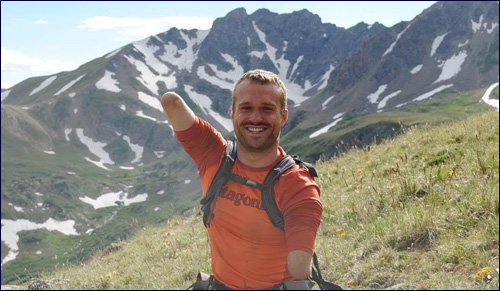 Vampire Weekend's Surprising Jewish Stories
Vampire Weekend's Surprising Jewish Stories


4 min read
Kyle Maynard’s courage to live with no excuses demonstrates the sukkah mindset.
Kyle Maynard was born without hands or feet, but that didn’t stop him from becoming the first quadruple amputee to climb to the top of Mount Kilimanjaro.
In order to climb to the summit of a mountain that even the most experienced climbers find daunting, Kyle literally crawled up the mountain, wearing specialty ice picks and snowshoes on his limbs. Describing the climb Kyle said, “Around the fifth day, I didn’t think I could make it. My arms and legs were swollen from the climbing. I kept going, chanting a mantra I learned from a Navy Seal, ‘Not dead, can’t quit.’ And finally, I reached the top.”
Maynard is also a NY Times bestselling author of the book No Excuses, a mixed martial arts fighter and a winner of ESPN’s Best Male Athlete with a Disability award in 2004 and 2006. He speaks all over the world about finding our ‘why’ in life and getting rid of the excuses that hold us back. “You can look at me and tell me that I was born just a little bit different. The nature of the excuses is disabling. The only true disabilities that exist are the ones we allow in our lives. That ‘why’ question, why are we here on this planet, is a powerful one.”
How does someone like Kyle develop the strength and the courage to live his life with this kind of optimism and purpose when so many of us blessed with far better health, feel limited by our own excuses?
WATCH THIS INSPIRING ESPN VIDEO OF KYLE MAYNARD
The answer seems to be rooted in our mindsets – how we see ourselves and our experiences. In 2006, Dr. Carol Dweck wrote a groundbreaking book called Mindset: The New Psychology of Success in which she explains the difference between a growth mindset and a fixed mindset. The fixed mindset believes that our traits – intelligence, morality, talent – are all carved in stone, and that there is nothing that we can accomplish beyond the “fixed” limits of the hand that life has dealt to us. In contrast, the growth mindset believes our basic qualities are all traits that we can cultivate through our own efforts. The growth mindset asserts that even though people are born with different aptitudes and interests, every single one of us can change and grow through learning and experience.
Dr. Dweck presents numerous studies that show how the most successful people in any field are the ones with a growth mindset, people who refuse to allow the excuses of “that’s just the way it is” to hold them back from their goals.
Building and moving into our sukkahs embodies this powerful growth mindset. We walk out of our warm, comfortable homes and sit in a temporary shelter beneath the stars, and we are reminded that all the things in our lives that typically define us – our houses, our careers, our possessions – are not the core of our identities. We have so much more potential within us that we haven’t yet even begun to tap into. As the psychologist William James wrote: “Most people live in a very restricted circle of their potential being. They make use of a very small portion of their possible consciousness and of their soul’s resources in general, much like a man who, out of his whole organism, should get into the habit of using and moving only his little finger.”
The sukkah opens us up to the untapped resources of our souls by giving us access to a spiritual shelter that creates space for believing in and recognizing the tremendous inner strength that God has gifted to each of us. And when we sit beneath the autumn sky, we can step out of the fixed mindsets of yesterday and remember that we are all meant to change and grow, that our qualities and our experiences are not set in stone. That the homes that we think of as permanent are temporary too. That the things we try desperately to hold onto eventually need to be let go. That even who we were last week may not be the people walking into the sukkah today.
It reminds us that the limits we see in our lives exist only because we believe they are holding us back. The sukkah mindset is a growth mindset; it challenges us to walk outside and see the endless potential in the stars above us. It shows us the incredible blessings in our lives that surround us like the walls of the sukkah, revealing the blessings that are within us, just waiting for us to put our excuses aside so that we can share them with the world.
